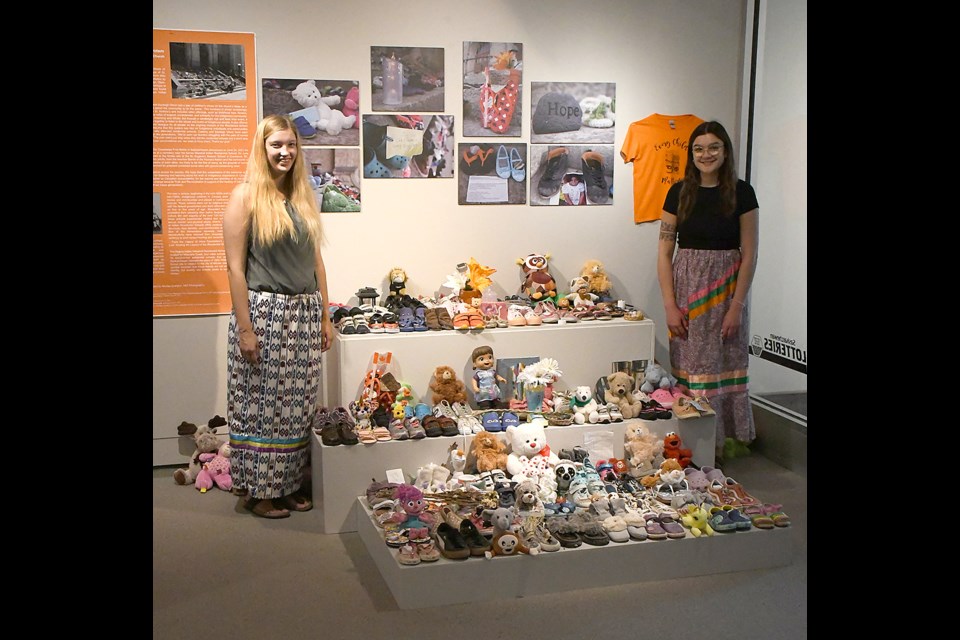And it’s truly fitting, given the power of the message that was on display. More than 500 pairs of children’s shoes, stuffed animals, candles, notes and even photos of those lost were left by Moose Javians, far exceeding the original goal of 215 — one for each body found in the Kamloops residential school unmarked grave — set by organizers and sisters Cassidy and Kayleigh Olson.
“It was actually really overwhelming in the end to see all the shoes, when we visited the steps and saw how many there were, it was pretty powerful,” Cassidy said on Sunday afternoon while visiting the new MJMAG display alongside Kayleigh. “And knowing that so many people had laid out those shoes… that was really big.”
The duo both call Whitecap Dakota First Nation their home reserve and have direct family connections to residential school survivors. That made the spontaneous act that much more meaningful, especially once the community got behind it.
“Myself, personally, I didn’t even think it would get as big as it would get or that we’d reach our total of 215, I was kind of hesitant,” Kayleigh said. “But I was super grateful that we had some shoes just to start off and begin with, then when we reached 500 or so, that was just so surreal because I never imagined that to happen. And whenever we’d drive by or drop by, there were always people there paying their respects and talking to one another about it.
“We’re just happy to see how well it turned out, especially for Moose Jaw,” she added. “We’re the kind of community that needs to start stepping forward, so I was really thrilled to see so many people support it.”
When the time came to remove the display, Cassidy decided to contact MJMAG curator Jennifer McRorie to see if something could be done to help continue the conversation and keep the message alive.
“She was super quick to get back and said ‘we need something that’s not just history-based, we need something that can help educate’,” Cassidy said. “She said to bring the shoes over as soon as they were taken off the steps, then she contacted us the next day and said ‘I think I found a display and I think I found a vision’.”
The rest is now permanent history — a large glass display case holding hundreds of the shoes sits next to an open stand of still more pairs, along with photos and information about what it all means and how it came together.
“For these children and their spirits, this had to happen” Kayleigh said. “People need to understand the truth and that these schools didn’t happen that long ago. It’s a chance for people to understand who we are as Indigenous people and why we face all these social issues and stereotypes that everyone thinks about. I really hope this will open the door to conversations about residential schools, and that it will open many other doors to things we carry as Indigenous people.”
The work the sisters have put into spreading awareness and creating support for residential school survivors doesn’t end there.
They’re currently selling orange ‘Every Child Matters’ t-shirts featuring a pair of moccasins their kunshi — Dakota for grandma — made soon after she left the residential school system. They’re selling for $20 each, with all proceeds going to the Residential School Survivor Circle in Saskatchewan.
You can buy one by visiting https://bit.ly/2U1FbdM.
“(Their kunshi) being a survivour is very significant to all of this” Kayleigh said. “We do things for her and our relatives that weren’t able to have that voice and be Indigenous people. So I like to say I do this for my family and the others in the spirit world who won’t be able to do things like this.”




